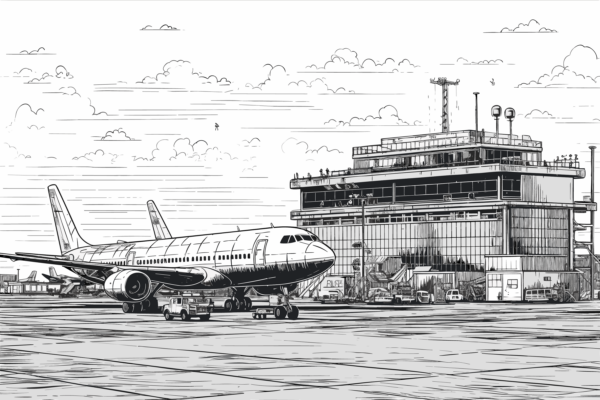

As an island city and home to India’s commercial capital, Mumbai is not new to high rises. Yet, with a built-up area of nearly 3.0 million square feet, One and Two Island City Center (ICC) at Dadar will carve a place for itself when the project is completed by late 2018.
To be built over a 29-acre site and standing at 59 and 67 stories, One and Two ICC will tower over the Mumbai skyline, said Abdo Kardous, managing director and senior vice president of Asia-Pacific operations for Hill International.
In September 2014, Hill was awarded a four-year contract – valued at $6.5 million – by Bombay Realty to provide project management consultancy and site supervision services for the two luxury residential towers.
On January 15, 2016, a small celebration for the general contractor’s first anniversary was held with completion of all shoring, 80% of excavation complete, both towers to podium level, non-tower areas well underway and erection of the lift core Automatic Climbing System (ACS) underway. Project milestones to achieve ground floor were met on time. Upon completion of the ACS installation, the project is programmed to rise in eight day cycles.
“Besides PM/CM [project and construction management], our services will include managing the detailed design, assisting with procurement, safety, administering the different packages, overseeing the work of the main contractor [Larsen & Toubro] and keeping an eye on quality assurance/quality control, to name a few,” he said, adding that Hill has a dedicated team of about 20 personnel for the project.
With real estate prices in Mumbai one of the highest globally and several civil construction projects underway, Hill has not found it a challenging task to hire locally experienced and competent staff, Kardous said.
“We have come across professionals who have returned to Mumbai after working in the construction industry in Kuwait, Bahrain and the UAE. They have brought with them a wealth of experience in the delivery of high-quality projects on time and within budget,” he said.
The ICC contract will pave the way for Hill to not only set up a core team to serve Bombay Realty, but also enable the company to grow its profile in the Mumbai metropolis.
“This [the ICC contract] is a high-profile contract which will give us an opportunity to familiarize ourselves with working in western India’s real estate market. The project employs renowned design firms, a leading contractor and the key subcontractors so our management of their services will create awareness and exposure for Hill International,” he said.
For Philadelphia-based Hill International with 4,900 professionals in 100 offices worldwide, targeting primarily the buildings, transportation, environmental, energy and industrial sectors, the company re-started its India operations in mid-2012 with the opening of an office in Gurgaon.
With a total of six other contracts in Northern India in the real estate sector, Hill has now set its sights on highway, railway and industrial projects, targeting to win the first contract in 2016, Kardous said.
While India presents endless prospects, operating there comes with its own set of challenges, Kardous said, including hard-to-navigate eligibility criteria on government projects; issues related to work permits and visas for experienced foreign nationals, and changes in companies laws and local regulations.
“Also, certain potential clients often mandate that a consultant must hire all of the professional personnel proposed to be assigned to a project even before it goes to bid. Failure to do so can result in a monetary penalization that could total up to 10% of the billing rates. All of these things and onerous payment terms mean that Hill and companies like us must assume a great deal of risk.”
Dr. Panagiotis Kefalas, vice president for business development in Asia-Pacific and based in India, said: “It is important to remember that India is a sub-continent—not just a country—and the localization factor is very strong. Also, India is a multi-driver vehicle, with many, many people involved in decision-making.”
Sooner, rather than later, and in order to cope with the increased pace of development projects, changes will come effecting how India does business with foreign companies something that China has embraced for more than three decades. But Hill has already positioned itself to take advantage of that change and will be ahead of the curve by creating critical mass in India.
By Ashok Dutta
Share

April 11, 2024 | Articles
A Model Move: Managing Move-In at the Sylvia H. Rambo U.S. Courthouse

April 8, 2024 | Articles

April 4, 2024 | Articles
Driving Growth and Seizing Opportunity: Lukasz Marcinkiewicz Joins Hill as Country Manager, Poland

April 1, 2024 | Articles

March 27, 2024 | Articles
Building the Future: Women’s Leadership and Community Engagement in the Construction Industry

March 25, 2024 | Articles
Leveraging Data Analytics and Dashboards for Enhanced Project Performance

February 26, 2024 | Articles
Continuity, Creativity, and Collaboration: Delivering PennDOT’s Route 18 Signal Upgrade
We and use cookies and other tracking technologies to improve your experience on our website. We may store and/or access information on a device and process personal data, such as your IP address and browsing data, for personalised advertising and content, advertising and content measurement, audience research and services development. Additionally, we may utilize precise geolocation data and identification through device scanning.
Please note that your consent will be valid across all our subdomains. You can change or withdraw your consent at any time by clicking the “Consent Preferences” button at the bottom of your screen. We respect your choices and are committed to providing you with a transparent and secure browsing experience.
| Cookie | Duration | Description |
|---|---|---|
| cookielawinfo-checbox-analytics | 11 months | This cookie is set by GDPR Cookie Consent plugin. The cookie is used to store the user consent for the cookies in the category "Analytics". |
| cookielawinfo-checbox-functional | 11 months | The cookie is set by GDPR cookie consent to record the user consent for the cookies in the category "Functional". |
| cookielawinfo-checbox-others | 11 months | This cookie is set by GDPR Cookie Consent plugin. The cookie is used to store the user consent for the cookies in the category "Other. |
| cookielawinfo-checkbox-necessary | 11 months | This cookie is set by GDPR Cookie Consent plugin. The cookies is used to store the user consent for the cookies in the category "Necessary". |
| cookielawinfo-checkbox-performance | 11 months | This cookie is set by GDPR Cookie Consent plugin. The cookie is used to store the user consent for the cookies in the category "Performance". |
| viewed_cookie_policy | 11 months | The cookie is set by the GDPR Cookie Consent plugin and is used to store whether or not user has consented to the use of cookies. It does not store any personal data. |


